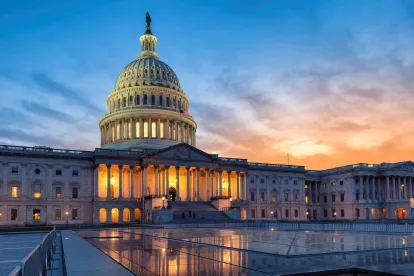As September gets underway and Washington returns from a busy recess, important deadlines loom. August saw the introduction and passage of the Inflation Reduction Act, the Biden Administration’s announcement of student debt cancellation, and the publication of multiple regulations. Now, with 60 days until the Midterm Elections, Congress looks to finish up its to-do list.
On the agenda this month is a long list of must-pass bills and high priorities for Congress and the Biden Administration. This includes annual appropriations funding and FDA User Fee Reauthorization. Additionally, Congress is considering bills on gay marriage, contraception, antitrust, and mental health funding. The Biden Administration now has the task of implementing the Inflation Reduction Act, CHIPS Act, and other major pieces of legislation.
See below for greater detail on key issues and more of what’s to come in this month’s edition of What’s Next in Washington? presented by the Foley & Lardner Federal Public Affairs team.
1. August recap: Inflation Reduction Act, student loan cancelation, and federal regulations
i. Prior to the beginning of the August Recess, Congress passed the Inflation Reduction Act. Democrats hailed the package as upholding a key campaign promise made in 2020. The Inflation Reduction Act represents the largest federal investment into renewable energy. $370 billion of the $700 billion package aims to combat climate change by providing tax credits and incentives for EVs, hydrogen production, carbon capture technology, energy security, and more. You can read more about the energy provisions of the law here.
ii. Healthcare provisions of the law include allowing Medicare to negotiate the price of prescription drugs, capping insulin prices at $35 per month for Medicare enrollees, and capping out-of-pocket drug costs for seniors enrolled in Part D at $2,000 per year. You can read more about the healthcare provisions of the law here.
b. Following months of deliberation, President Biden announced on August 24th his administration’s plans to cancel student debt for eligible borrowers.
i. The plan will forgive up to $10,000 in federal student loan debt for those making $125,000 per year, and $250,000 per year for married couples.
ii. Pell Grant recipients will be provided up to $20,000 in debt cancellation.
iii. The plan continues the pause on interest and re-payments until December 31st, 2022.
iv. This announcement drew a mixed reaction from Congressional Democrats, some of whom said that it did not go far enough and requested that the Administration forgive additional student debt.
c. The Biden Administration also issued its final rule on allowing the sale of Over-the-Counter Hearing Aids and has begun publishing its final rules on the No Surprises Act.
i. You can read more on the OTC Hearing Aid rule here and more on the No Surprises Act here.
2. Deadlines loom on appropriations funding
a. The fiscal year ends on September 30th, but passage of all 12 appropriations bills to fund the government prior to then is unlikely.
b. With no agreement on spending between the “Four Corners” as the Midterm Elections near, a continuing resolution (CR) will likely be passed in September to extend funding through mid-December.
i. The Office of Management and Budget (OMB) sent a report to Congress outlining top line necessity inclusions for a CR.
ii. Leahy has expressed a desire for new spending levels in the short-term package before the year ends.
c. Senate Appropriations Chairman and Ranking Member Patrick Leahy (D-VT) and Richard Shelby (R-AL) are both retiring at the end of the 117th Congress. Both Senators have expressed a desire to finalize spending before their departure from Congress.
d. One major point of contention is Senate Majority Leader Chuck Schumer’s (D-NY) plan to attach permitting reform to the upcoming spending bills.
i. This comes from the agreement between Schumer and Sen. Joe Manchin (D-WV) to allow passage of the Inflation Reduction Act. House Natural Resources Chairman Raul Grijalva (D-AZ), alongside other progressive House Members, have pushed back against this plan and have mobilized support in opposition.
e. Additionally, the Biden administration announced in late August that it is requesting $26.3 billion in emergency COVID-19 and Monkeypox funding to be included in a CR. Much of this funding would go to the Department of Health and Human Services (HHS) for purchase of vaccines and to work covering costs associated with the vaccine for uninsured and underinsured Americans. Congress has had very little appetite for additional COVID-19 funding this year.
3. The House and Senate expect to take up various policy bills before recessing for the midterms
a. Despite the waning number of session days for Congress, Senate Majority Leader Chuck Schumer has promised several votes on major pieces of legislation in September.
i. The Respect for Marriage Act, which codify the Supreme Court’s decision to allow same-sex marriage in Obergefell v. Hodges, has been slated for a vote. There have been discussions among Democrats to attach a provision codifying same-sex marriage, as outlined in the Respect for Marriage Act, to a CR.
ii. There has been a push to take up the Right to Contraception Act in the Senate. The bill would set statutory protections for an individual’s right to access contraceptives, however it was blocked in committee in July. 1. Both bills passed the House with bipartisan support in July.
b. The American Innovation and Choice Online Act (AICOA), a sweeping antitrust bill from Senators Amy Klobuchar (D-MN) and Chuck Grassley (R-IA), has been sidelined since it was reported favorably out of the Senate Judiciary Committee in January.
i. The AICOA would aim to prohibit major tech platforms from giving an advantage to their own products over rival companies that rely on their services to conduct business. Sen. Klobuchar has expressed confidence that the bill will see the Senate floor in the fall.
c. FDA User Fee programs expire on October 1 and with no agreement on legislation in sight, it is likely that a clean and temporary reauthorization will be attached to a CR this month. This would allow for an extension of conference time between the Senate HELP and the House Energy and Commerce Committees in order to come to agreement on a final piece of reauthorization legislation.
i. The House passed the Food and Drug Amendments of 2022 (FDA2022) by a vote of 392-28 in June. The Senate HELP Committee favorably reported their version of the bill, the FDA Safety and Landmark Advancements (FDASLA), by a vote of 13-9.
ii. Senate HELP Ranking Member Richard Burr (R-NC) later introduced a “clean” reauthorization that does not contain the reforms outlined in the HELP-passed version of the bill.
d. The bipartisan Restoring Hope for Mental Health and Well-Being Act of 2022, which passed the House in June by a vote of 402-20, has been held up in the Senate HELP Committee. A bipartisan group of House Members has been working with their Senate counterparts to bring the bill to the floor for a vote prior to the end of the legislative session.
i. Authored by Energy & Commerce Chairman Frank Pallone and Ranking Member Cathy McMorris Rodgers, the bill aims to reauthorize and modify a multitude of grant programs to bolster mental health funding.
e. The Electoral Count Act now has 10 Republican co-sponsors in the Senate.
i. Sen. Chuck Grassley (R-IA) announced on September 1st that he will co-sponsor the Electoral Count Act, providing Democrats a filibuster-proof Senate Majority.
ii. The bill would reform the 1887 law that governs how Congress deals with presidential-election disputes, namely the role of the Vice President in the counting of electors and the role of Members in objecting to election results.
iii. Earlier in the year, Sen. Roger Wicker (R-MS), predicted that the bill would get 80+ Senate votes.
4. Campaign season officially starts as Democrats and Republicans hit the trail to sell their messages to voters.
a. The 118th Congress promises to look significantly different as the primary election cycle has already seen the defeat of 15 incumbents. Additionally, 39 incumbent House Members and seven Senators have announced their retirement.
b. After months of lagging poll numbers, Democrats are now more bullish about their prospects in November.
i. Citing a state-wide referendum in Kansas on abortion rights as opposition to the Supreme Court’s ruling in Dobbs v. Jackson Women’s Health Organization, special election results in New York’s 19th congressional district and Alaska’s At-Large district, alongside the passage of major legislation, Democrats look to retain their majorities in the fall.
c. Republicans see a favorable electoral map and inflationary concerns among voters as their keys to victory in November.
i. For the most-up to date outlook on the 2022 Midterm Elections, including House and Senate race ratings, primary dates, and retiring incumbents, read more here.
d. The Midterms will be held on Tuesday, November 8th. The final primaries will be held in Delaware, New Hampshire, and Rhode Island on Tuesday, September 13th.
5. September will see the continued implementation of the Biden Administration’s agenda
a. Following the passage of the CHIPS Act, the Biden Administration now faces the task of implementing the law. President Biden has already signed an executive order to begin implementing the CHIPS Act and outlining the priorities for the law.
i. The order establishes a steering council, implementation priorities, and CHIPS.gov, which will act as the channel through which the Department of Commerce will publish updates about the law’s implementation.
ii. Among these priorities are seven “grand challenges” in measurement, standardization, and modeling that the Commerce Department and the National Institute of Standards and Technology have outlined as obstacles to overcome to help strengthen the U.S. semiconductor industry.
1. These challenges include improving metrology in all stages of semiconductor development, assembly and packing, and performance verification for the next generation of semiconductors.
iii. The law allocates a total of $52 billion to strengthen U.S. semiconductor research and development.
b. The Department of Transportation continues to implement the Infrastructure Investment and Jobs Act (IIJA).
i. Transportation Secretary Pete Buttigieg spent much of August traveling the country highlighting some of the grant money that has been allocated for infrastructure projects.
ii. Buttigieg and White House Infrastructure Coordinator Mitch Landrieu have acknowledged that the goal of the tour has been to highlight the work that the infrastructure bill is doing across the country and to assist in boosting vulnerable Democrats.
iii. In August alone, more than $2.2 billion in IIJA grant money was allocated towards infrastructure projects. More than 5,300 construction projects will begin in the month of September under the tutelage of the Department of Transportation.
Scott Klug and Michael Crossen also contributed to this article.







 />i
/>i

